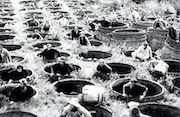|
What would it mean to end a movie about the banality of a Nazi and his family with a criticism of the remembrance of what he did?
|
|
|
|

|
| # ? May 3, 2024 05:17 |
|
live with fruit posted:What would it mean to end a movie about the banality of a Nazi and his family with a criticism of the remembrance of what he did? I dont think its a criticism necessarily. I think its an expression of feeling uncomfortable with the "compartmentalization" that everyone has to do. You cannot hold the horrors of Auschwitz (or Rwanda, or Palestine, or...) front of mind for your entire life, you have to keep living despite the background buzzing of horror. Eventually, the cleaners will have to dust the killing ovens of the genocided and the museum will clear out of tourists. Obviously, Rodolf and his family compartmentalize in pursuit of selfish and "evil" reasons, while the cleaners walking the halls of Auschwitz compartmentalize because you literally can't work there and not do so, it is a human commonality between us all. Basically, I do agree with Martman below: Martman posted:I viewed that vision as being very much from Rudolf's point of view rather than making the museum look bad to the audience. He has a strange vision of the future of his great project; I don't think the movie was suggesting there's something wrong with cataloging and displaying these horrors, it was just a Nazi realizing for a moment that his mission is doomed and he's going to be an odd blip in history. He's just so soulless that he sees it and basically responds "whatever" and keeps on trucking.
|
|
|
|
I honestly don't even think he necessarily recognizes it as a negative depiction of his actions, given that it's a vision of his crowning achievment being carefully tended to and the clothes of his victims in big piles for everyone to look at.
|
|
|
|
I found this movie immensely compelling and fascinating. Truly a unique film, and one of a handful from this past year to really stand out for me.quote:also, I appreciate that the polish girl planting fruit for the laborers directly led to them being shot for fighting over apples. Nice little gestures mean gently caress all when the evil is that immense. Absolutely. Also important to note that the Polish girl's actions are juxtaposed with Rudolf reading out fairy tales, the second of which notably ends with the witch being burned alive in an oven "as a punishment for her horrible deeds." The visions are thus themselves a dark fairly tale, in which the girl's actions unexpectedly lead to tragedy for the people she is trying to help. And when Rudolf's son observes this, he quietly says to himself, "don’t do that again," as if he's learned the moral of the fable. I also loved the way that Glazer interwove nature and the background horror throughout. Hedwig praises the virtue of their life in nature, "finally away from the city," and we see them picking berries, riding horses, spotting herons, and tending the garden. One of the most arresting sequences in the movie was when Rudolf takes the two children down the river to go fishing, steps on a human bone, and rushes to get the children out of the river; later on, we see him ejecting ash from his nostrils and realise that his idyll has been contaminated by the extermination upstream. The punishment he metes out to the prisoner caught fighting over an apple later on? Drowning him in the river. Similarly, the garden that is being planted at least in part to camouflage the camp (Hedwig tells her mother that she's planted vines to try to cover the wall) is fertilized with ashes, presumably taken from the camp. Their precious nature is gradually being more and more despoiled by what's happening behind the walls. Martman posted:I viewed that vision as being very much from Rudolf's point of view rather than making the museum look bad to the audience. He has a strange vision of the future of his great project; I don't think the movie was suggesting there's something wrong with cataloging and displaying these horrors, it was just a Nazi realizing for a moment that his mission is doomed and he's going to be an odd blip in history. He's just so soulless that he sees it and basically responds "whatever" and keeps on trucking. My take on this was a bit different, and in line with some of the more meta analyses here. A ham fisted filmmaker would include a moment in which the commandant at Auschwitz was overcome by a vision of the horror he has wrought. Here we see instead an almost comical juxtaposition of the ovens being swept and the shoe pile exhibition being cleaned in the contemporary world. These images are so commonplace cinematically today as to be threadbare; thus, what Rudolf is overcome by is the bathetic vision of his grand project having become mundane, rather than truly affecting. The one part I'm not really sure I understand, though, is the sudden fade to red. It'd be great to hear people's thoughts on that.
|
|
|
|
I don’t really see it as a direct vision, just a moment of choice and a pause for audience reflection (much like the all red scene) before he descends further into the darkness. But I think it can be read either way
|
|
|
|
I like that the climax of the movie the vision of present day is left kind of ambiguous on if Höss envisioned it. If that's the case, it reminds me of this part of the From Hell graphic novel, where William Gull sees the future after murdering a woman:   I was incredibly disappointed when the 2001 movie adaptation left that part out.
|
|
|
|
oof, From Hell should not be colorized
|
|
|
|
Criterion channel has some other glazers on it [if it now. How are his other films? I've only seen Under the Skin besides this one. Both are good stuff.
|
|
|
|
BIRTH is incredible.
|
|
|
|
Sexy Beast is great, incredibly fun Ben Kingsley performance
|
|
|
|
Uncle Boogeyman posted:oof, From Hell should not be colorized Yeah :/ HUNDU THE BEAST GOD posted:BIRTH is incredible. Only one I haven’t seen yet, I’ll throw it on the pile
|
|
|
|
checkplease posted:Criterion channel has some other glazers on it [if it now. How are his other films? I've only seen Under the Skin besides this one. Both are good stuff. There’s literally nothing Glazer has made that’s anything short of fantastic.
|
|
|
|
Sexy Beast, Birth, and Under The Skin are all great. Honestly, Zone of Interest strikes me as his least good film. I'm still unsure how I feel about it really.
|
|
|
|
Okay zone of interest I would definitely recommend seeing this movie in theaters bc I want Glazer to make more movies… but this movie is also tailor made to make you hate a live audience. Sound is extremely important here, so every conversation, every person munching popcorn every cell phone buzzing is gonna make you want to strangle someone. Yes it’s the movie of the year, but man this is not a movie for a wide audience. It begins with two minutes of a black screen and all you have is sound, which is a surprisingly heavy handed way of signaling the audience to listen. But it’s also shot in a style more reminiscent of third world movies (bc Glazer primarily relied on hidden cameras): the camera rarely moves, and you usually only have one continuous shot per scene and almost no close ups on actor’s faces so they have to use their whole body. Lastly the movie is mostly unspoilable, you know the plot, the movie is counting on you knowing what the story is before you sit down. Or to put it another way, the engine of the movie is not its narrative sequence but instead relentless juxtaposition (family/camp, sound/image, husband/wife, working class/bourgeoisie and especially cleanliness/filth) The most impressive performance is by Hüller as Hedwig. She moves with a gait that is slightly ungainly, almost ogrish, delighting in her social mobility and stolen clothes. Trotsky’s analysis of the nazis was that they were a party supported by the petty bourgeois in the service of capital, and this is a story of upward mobility. Unfortunately every review I’ve seen has defaulted to Arendt’s cliché of the banality of evil, and while clearly this has had some influence on the film (Glazer has said as much) I think this greatly misses the mark. Arendt’s frustration with Eichmann was that he treated genocide like a job, following orders and outsourcing any moral responsibility to the state. The characters here are, to the contrary, very active and enthusiastic participants, they obsess, they make jokes about the victims, they work long hours and attempt to find efficiencies. These aren’t bureaucrats, these are strivers looking to climb the ladder. Few random closing remarks: significant amount of attention is given to a pool, which is a symbol of opulence but I do wonder if Glazer is familiar with the ‘pools at Auschwitz’ argument, which was a talking point of the far right for a few years. There is a juxtaposition (again) of a fairy tale being read to a child as a real life hero attempts to alleviate suffering, which reminded me of when Iran said it couldn’t retaliate against the US for murdering Suleimani bc the US only had fictional heroes like Spider-Man (obviously this isn’t what Glazer is trying to say). Lastly Glazer has said he didn’t write this movie thinking about the past but the present, for the audience to reflect on their similarities to the Höss family, which I think ultimately makes this closer to the mobster movie genre, in the sense that those are movies that make implicit criticisms of capitalism explicit. I dislike reading a movie in light of current events but just look at all the people running cover for genocide in the past few months. Turn on the television, open a newspaper and you’ll find a Höss waiting to tell you that fifteen-year-olds shouldn’t really be counted as children. Oh right the colors, the whole movie looks sickly with a color pallet that evokes colorized photographs of the time, together with the sound this lends everything a sense of uneasiness and illness. A lot of people compare Glazer to Kubrick, and he himself doesn't shy away from the comparison. This movie reminded me of the Shining, in the sense that Kubrick relentlessly hosed with continuity and the overall layout of the hotel, creating an atmosphere of unease and wrongness about the place even without the more explicit scenes. Glazer I think is going for a similar effect, but with color and sound.
|
|
|
|
I think the best thing I've heard about this movie and that banal Arendt quote is that its formulation is off. Evil is not banal, this is evil in service of banality. It is actively and deliberately slaughtering millions so you can build a chintzy pool on their ashes.
|
|
|
|
Magic Hate Ball posted:I thought this was just okay, but reading other reviews I’m wondering if the sound at my screening was too low because there were only a couple moments where the sound from the camp was notably gruesome (the red scene, the apple) but in all the other scenes it just sounded like they were living next to a construction site with occasional gunfire. Was I meant to be hearing a constant churn of distant screaming or something? Ok, so now that it's on VOD I took a look at it and yes, my screening's volume was WAY too low. There is so much happening in the sound design that I just straight up was not privy to, but what shocked me most was that the sound from the incinerator is basically constant. It totally changes the vibe of the movie.
|
|
|
|
Magic Hate Ball posted:Ok, so now that it's on VOD I took a look at it and yes, my screening's volume was WAY too low. There is so much happening in the sound design that I just straight up was not privy to, but what shocked me most was that the sound from the incinerator is basically constant. It totally changes the vibe of the movie. Yeah this is a movie that needs to be seen with the right sound levels. There was pretty much constant background noise from the incinerators as well as intermittent but regular shouting, shooting, and barking. quote:The most impressive performance is by Hüller as Hedwig. She moves with a gait that is slightly ungainly, almost ogrish, delighting in her social mobility and stolen clothes. Trotsky’s analysis of the nazis was that they were a party supported by the petty bourgeois in the service of capital, and this is a story of upward mobility. I noticed Hedwig's awkward gait as well, but I interpreted it a bit differently. It reminded me of how pregnant women walk, and I read it as subtly signaling the sacrifices she had made to fulfill the Führer's call to produce more Aryan children, perhaps evoking some sort of injury due from childbirth. This ties into her attachment to the home and keeping the family in Auschwitz despite Rudolf's transfer: in her mind, she has done her part for the Reich and should now be allowed to reap the reward of her luxurious home, regardless of Rudolf's posting. quote:Lastly Glazer has said he didn’t write this movie thinking about the past but the present, for the audience to reflect on their similarities to the Höss family, which I think ultimately makes this closer to the mobster movie genre, in the sense that those are movies that make implicit criticisms of capitalism explicit. I dislike reading a movie in light of current events but just look at all the people running cover for genocide in the past few months. Turn on the television, open a newspaper and you’ll find a Höss waiting to tell you that fifteen-year-olds shouldn’t really be counted as children. The movie is all the more timely in light of the fact that the events of October 7 played out as the prisoners of a giant ghetto spilling out into the comfortable Israeli suburbs that were literally visible from the walls surrounding Gaza. Much of the disgust at the events in the West is barely contained outrage among Western elites that Palestinians dared to leave the prison and disrupt the lives of "normal" middle class Israelis. MeinPanzer fucked around with this message at 15:49 on Feb 22, 2024 |
|
|
|
live with fruit posted:He doesn't throw up but they cut to people cleaning up eighty years later. That has to be something about the distance his family has it. Glad someone else had the same thought. Also there's a few shots of the running river that must be referencing The Look of Silence (you can see what I'm talking about 15 seconds into the trailer https://www.youtube.com/watch?v=bp1xT302VcY) So many of the ironic juxtapositions felt brilliant. It's such a delicate maneuver to pull off but managed it over and over again. I confess I didn't know who Hoss was going into the film, and was surprised after reading his Wikipedia just how senior and central he was (I thought the suggestion that he appeal directly to Hitler was meant to be slightly more cheeky than it apparently was). It wasn't clear to me during watching that he was the administrator of the entire camp- I thought there might've been a number of them at his level given how sprawling the complex was. It was definitely quite a feeling afterwards to see his statements at Nuremburg and photos of his execution just feet from where the film was shot. Glazer has been working on this for so long but it's just horrible how much the film reminded me of a certain atrocity being committed as we speak in the name of these victims. The movie is obviously intended to hold a mirror up to us and boy does it do that effectively https://www.newarab.com/news/israeli-minister-may-golan-proud-gazas-destruction.
|
|
|
|
Jewmanji posted:Glazer has been working on this for so long but it's just horrible how much the film reminded me of a certain atrocity being committed as we speak in the name of these victims. The movie is obviously intended to hold a mirror up to us and boy does it do that effectively https://www.newarab.com/news/israeli-minister-may-golan-proud-gazas-destruction. Girlboss!
|
|
|
|
For me, the red scene felt like a cinematic represenation of dissociation, borne of the inability to continually maintain the illusion of a normal family life whilst unspeakable sin is perpetrated in the background. In cinema, images and audio work together in a broadly accepted and expected fashion, but what we are seeing and what we are hearing simply do not go together. Over the images of nature, life and growth, we hear abject horror and degradation. For a moment, the film itself recoils, unable to cope with what is happening. It breaks down into meaningless vision and sound, a rejection of reality. After a brief period of detachment, the facade snaps back into place with a wholesome scene of the memories of a fondly remembered vacation. For a while, things make sense again; the walls are back up, the sound matches the visuals - but the memory lingers.
|
|
|
|
|
Android Apocalypse posted:I like that the climax of the movie the vision of present day is left kind of ambiguous on if Höss envisioned it. If that's the case, it reminds me of this part of the From Hell graphic novel, where William Gull sees the future after murdering a woman: Having read this recently before seeing it I had much the same thought - it's a revelation and embracing of psychopathy and evilness. It's less about the "banality of evil" but the cheapness of life in the eyes of fascism - it's presented as mundane and day-to-day for these people, but they are all absolutely cogniscient willing to be advantaged by the genocide over the brick wall. Hedwig lashing out at the house help by threatening to spread their ashes in the fields, just after burning her mothers' letter is pretty explicit, and her cutting the conversation with Rudolf short after he admits to fantasising over gassing the party shows disgust that such tactics could ever thought to be used on people - the othering and dehumanisation of Jewish people is pretty well documented. It's more Salo than Schindler's List. If anyone's read about transcendental style in film from Paul Schrader, I really think this leverages a lot out of that form. Schrader loves to use Bresson and Ozu as the high water marks for the style, and notes that Kubrick and Tarkovsky are moderate in their use of it (which I think Glazer is much more influenced by) but he was quoted as saying that the use of the style in this was a "parlor trick" (https://www.worldofreel.com/blog/2023/10/9/ls9iztsw6jjqgjo21l3omz3ghq2ry2) which I think is a bit of a misunderstanding. He's right in saying that there's the camp under the surface and the audience *knows* what that means, but I think that underscores the message of how hugely evil the concentration camp system was. The layered family dramas of Ozu and complex unravelleing of relationships and dynamics using slow cinema is fantastic, but Glazer has used it to really demonstrate the enormity of it all. There's no underlying "human" behind Hoss et al., just...sin.
|
|
|
|
I think there's a lot of human in the Hoss family as depicted in the movie, which is why so much of it borders on comedy - relatable mundanity, but in a hosed up setting, like an extreme New Yorker cartoon. Hedwig waddling around (either because of working class injuries or because Rudolf pumped five kids out of her) is a physical character choice that will stick with me for a long time.
|
|
|
|
Magic Hate Ball posted:I think there's a lot of human in the Hoss family as depicted in the movie, which is why so much of it borders on comedy - relatable mundanity, but in a hosed up setting, like an extreme New Yorker cartoon. Hedwig waddling around (either because of working class injuries or because Rudolf pumped five kids out of her) is a physical character choice that will stick with me for a long time. The scene of the teens making out on the side of the house is a good example. They're going through their rites of passage just like kids not growing up under the shadow of a death camp.
|
|
|
|
in addition to other things I also kept noticing the Hoss family pet dog, who could probably smell and hear death the whole time amazing film
|
|
|
|
Android Apocalypse posted:I like that the climax of the movie the vision of present day is left kind of ambiguous on if Höss envisioned it. If that's the case, it reminds me of this part of the From Hell graphic novel, where William Gull sees the future after murdering a woman:
|
|
|
|
Couldn't get over how insanely, disgustingly pale all the Germans were. The Hosses are dull oafs, but yeah the point is they're striver oafs. Pretty much a marriage based on mutual advancement. Interesting that Mrs. Hoss's mom used to work for a Jewish person who is now probably in Auschwitz. I thought it was interesting that she ended up not being able to take The Horror--maybe something there about how how the mom's Antisemitism as a kind of off-hand coping mechanism gets transformed into full blown extermationism in the next generation. Not sure what to make of the ubiquitous (black!) dog. He was the only one who seemed to be having a good time. I think to me the key is really when Mrs. Hoss (the Queen of Auschwitz!) is saying how this is her dream home. And I don't think we should assume that the screams in the background are an annoying downside--I think they're what make the place appealing to her.
|
|
|
|
I would say that Rudolf has compartmentalized the horrors, he acknowledges that they happen, but they are just part of the job. Hedwig though is in full on denial mode, she makes the garden in the house to try to hide the camp, she doesn't let the camp's inmates in her house, she instantly changes the topic when her mother ponders about the experiences of the inmates, she burns the note from her mother, etc. Hedwig's mother though can't distance to deny the camp, it keeps her awake, and she stares at it outside the window, she talks about the experiences of the inmates, etc. And so ends up fleeing. (also, Hedwig's mother complains the heat, maybe a vague allusion to hell?) I feel the film is try to show their coping mechanisms for something which is just an ugly part of what they actually want (a successful career, a idyllic household, or to be with one's family)
|
|
|
|
Tehdas posted:I would say that Rudolf has compartmentalized the horrors, he acknowledges that they happen, but they are just part of the job. I really can't agree with that view tbh - Hedwig is shown as fully able to calmly use the horrors to threaten one of the workers. I think denial is the wrong way to deem it, as it's more become a part of routine. It's wrong, but it's akin to someone being around weapons all the time and then using the threat "I'll loving shoot you in the head until your brain is a pink mist" when someone spills a drink on the carpet. It's desensitisation and acceptance that it's a just punishment for certain people, which is why Hedwig is so terrifying. She's in as deep as Rudolf, who's also not "compartmentalising" as he's relishing and letting the "job" bleed into his everyday life. He's sociopathic at best, psychopathic at worst, and Hedwig even realises that when he starts talking about his fantasy. She rebukes him for it because she still wants status and that requires a certain level of social nicety, despite her being in just as deep as him. Especially after Glazer's acceptance speech, I think it's super important to note that this is a film about unrepentant, full-blooded, capital-N Nazis - they are unquestionably complicit and accountable for the atrocities that are happening - and the language used to discuss character motivations and such is important to consider. Saying Rudolf is, essentially, "just doing his job" isn't excusing it, but it is minimising it because that job is literally constructing Auschwitz. Saying that Hedwig is in denial seems similar - while her job is less involved than Rudolf's, she's just as ingrained to the Reich war machine at a fairly high level, asking Rudolf to reach out to certain officers personally to keep the job and keep Auschwitz running. The mother isn't innocent, as she's shown to be knowledgable about the purpose of the camps - it's vague as to what her final reaction towards Hedwig is, but while she's shocked enough to leave after there's a realisation of the consequences of her actions, I don't know whether that absolves her. They're not coping, they're reaping the rewards of their labour. I do think there's a lot of allusions to hell, like the fades to red - I'd also bet the close ups of flowers have some meaning as well, but I'm poo poo at gardening so I'm not smart enough to make that link.
|
|
|
|
The scene where Hedwig threatens her servant with something like “I could have my husband burn you and spread your ashes in the garden” was absolutely meant to demonstrate that Hedwig is fully aware of what empowers her dream. Not to mention the arc that her mother has - she’s totally down with the idea of letting people die en masse if it means her daughter can have a nice life at first, until she is forced to literally live with the reality of it. Something as simple as the smell of the incinerators makes her unable to look past and justify the horrors taking place.LarsPorsenna posted:Not sure what to make of the ubiquitous (black!) dog. He was the only one who seemed to be having a good time. I don’t think the dog was having a good time, it was constantly on edge and begging for Hedwig’s attention because it lives next to the constant sound of gunshots, wails of pain, and most of all, other dogs - dogs whose purpose is to maim and kill rather than be loved.
|
|
|
|
https://twitter.com/EWagmeister/status/1768017513437430040
|
|
|
|
If Jonathan Greenblatt and Ben Shapiro are upset about something it’s a rock solid indication that you are safe taking the opposite stance. Edit: a bit surprised by the comments from the director of Son of Saul but I don’t know anything about the guy
|
|
|
|
....lol even having a millionaire colonizer on stage during your mild call for peace can't stop the colonizers from calling for your head.
|
|
|
|
It's pretty great that even the guy who bankrolled the film doesn't understand it.
|
|
|
|
I just find it funny that Michael Rappaport gets quoted. Who gives a poo poo what that guy thinks about anything? A true nobody.
|
|
|
|
I only care about Michael Rappaport's opinions on cats. https://www.youtube.com/watch?v=Q8i2WPxXxS4
|
|
|
|
Jewmanji posted:I just find it funny that Michael Rappaport gets quoted. Who gives a poo poo what that guy thinks about anything? A true nobody. he's a wack packer.
|
|
|
|
mcmagic posted:It's pretty great that even the guy who bankrolled the film doesn't understand it. The Auschwitz Museum themselves invited Elon Musk and Ben Shapiro at the behest of a far-right rabbi! Devout right wing operatives (including shameless antisemites) have a vested interest in "ownership" over Holocaust narratives.
|
|
|
|
The Shoah Foundation collected witness testimonies from October 7.live with fruit posted:What would it mean to end a movie about the banality of a Nazi and his family with a criticism of the remembrance of what he did? I thought it highlighted the banality of the remembrance. One of the best moments in Ken Burns's The US and the Holocaust was when a historian talks about how as memories fade the deaths of the Holocaust become merely statistics but that each person who died was not a statistic to themselves. They each had a life and a story that was different from one another but "the Holocaust" has become a symbol almost detached from the individual suffering visited upon each of them. I will say the US Holocaust Museum at the time I visited it 25 years ago did do something to counteract that detachment by giving you a pamphlet of a victim of the Holocaust which you would flip through as you made the tour following along with that person. I remember my family rooting for whoever they were handed because you did feel an attachment towards them and asking each other at the end if your person had made it. The baby of 18th months I was given did not make it. It affects me all these years later and drove me as a teen to read all I could about the Holocaust. That the supposed caretakers of the memory of the Holocaust have to my knowledge all come to the defense of fascistic barbarity visited upon a captive people says to me that it's all a show. The actual human beings shot en masse by Einsatzgruppen, beaten to death by their neighbors, starved in ghettoes, or walked from a cattle car to a room they'd never exit are mere abstractions to the people running these organizations. Sweeping the rooms in which it happened is just another chore. mcmagic posted:It's pretty great that even the guy who bankrolled the film doesn't understand it. Groovelord Neato fucked around with this message at 01:33 on Mar 15, 2024 |
|
|
|
Thanks for that great post. What is the significance of the Shoah Foundation comment? Is the implication that their cheapening the memory of the holocaust by wrapping Oct 7 into it as though it's a continuation of that?
|
|
|
|

|
| # ? May 3, 2024 05:17 |
|
Pirate Jet posted:
That’s what I interpreted too Also the kids to some extent
|
|
|
























